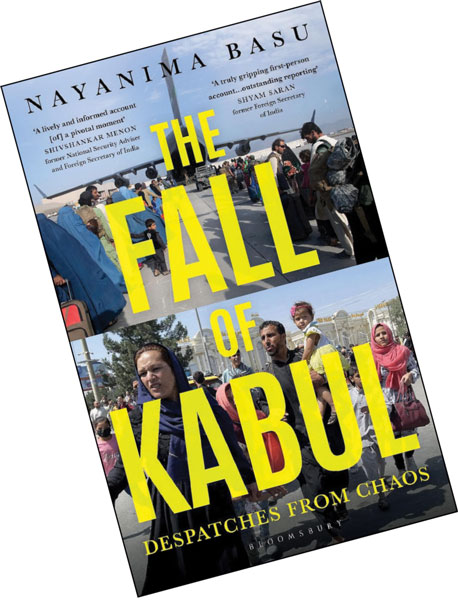The Fall of Kabul — Despatches from Chaos by journalist Nayanima Basu, (Bloomsbury; ₹599) promises a lot, but ends up a tad disappointing. Make no mistake about it…any journalist who has landed in the Afghan capital in August 2021, barely 10 days before its heartbreaking capitulation to the Taliban without any fight or resistance, will have a captivating and gripping story to tell.

Basu has one, and it is filled with suspense, drama, and serious questions on her returning home as the Taliban move into Kabul and quickly shut down exit routes from the city. But the manner in which she tells that story, the frequent whining and persistent attempt to paint herself a war hero, end up irritating the discerning reader.
But her story first. Having covered Afghanistan from Delhi for several years, in July 2021, as there was wide expectation of a peace deal between the Ashraf Ghani government and the Taliban, and the impending return of the dreaded Taliban to this beleaguered country, the author lands up in the city on Aug 8, 2021, to report for the online publication The Print, where she was working then.
The book is a bit of a thriller with elements of drama, often exaggerated, right from her arrival at the Kabul airport and journey to Hotel Serena, where the international biggies led by CNN and other Western media entities are camping. We get quite a bit of whining and constant patting on the back… how the other international media has so much help… superior equipment, a plethora of local helpers hired through tons of dollars, how so many other journalists are ‘embedded’ with this agency or that. But she is soldiering on with limited funds, and very little by way of local help. We are also told, rather sanctimoniously, how after she returned to India, no journalist bodies, including one of women journalists, invited her to tell her story! Had these elements been edited out, the narrative would have been more engaging.
In Kabul, Basu is completely surprised to find that everyone is optimistic about the peace talks with the Taliban initiated by the US in Doha. There is widespread belief that the Ashraf Ghani government will stay on, and a power-sharing deal with the Taliban worked out. Even when it becomes clear that the existing dispensation will fall and the Taliban will once again take over Afghanistan, most people tell Basu that this time around it would be a “different” Taliban; in order to get international acceptance, they would not revert to their regressive gender policies.
But very soon Basu finds for herself the exact opposite and how she manages to get away in the nick of time forms rest of the narrative. ‘Will I die tonight?’ is the title of one chapter, which describes how her editor asks her to get out of the country, and says her ticket has been booked on the first Air India flight out the next morning, which never lands. She somehow makes it to the airport, along with another Indian journalist, and after long hours of trauma and lurking danger to her life at the chaotic airport, has to flee to the Indian Embassy, and finally, after more wait, makes it home on Aug 17 by the Indian Air Force C-17 Globemaster. During the entire harrowing period, her foremost thought is about her young son waiting for her back at home in Delhi.
The book effectively brings out the shameful manner in which the US first attacked Afghanistan, occupied it, and then left its government high and dry, departing abruptly without tying up the loose ends, aiding the country’s speedy slide into the dark ages once again.
As always, Shah Rukh Khan’s name creates magic, and now Deepika Padukone has replaced Aishwarya Rai — she was the rage when I had visited Afghanistan in 2005. But King Khan continues to rule… even after 19 years!
A big plus of this book is that it provides in a useful capsule the history of this unfortunate country right from 1830 and the way superpowers like England, US and the Soviet Union played dirty games to expand their influence in Central Asia. It effectively brings out the shameful manner in which the US first attacked the country, occupied it, and then left its government high and dry, departing abruptly without tying up the loose ends, aiding Afghanistan’s speedy slide into the dark ages once again.
Any book on Afghanistan is interesting, and Basu’s narrative is good for speed reading. But if you want a really gripping account, complete with vivid descriptions, and in-depth reporting and analysis of the eventual mess that the western occupying nations led by the US and UK made in Afghanistan during NATO’s 20-year occupation there, do read Escape from Kabul—the Inside Story by (Major) Levison Wood and Geraint Jones. Here’s a teaser.
Referring to the US President Joe Biden’s statement that “our mission in Afghanistan was never supposed to be nation building”, the authors say: “This begs the question as to why — if the Taliban was not a terror group — the war was allowed to go on for two decades. If NATO’s 20-year mission was to eliminate terrorism, then it failed. Al-Qaeda are still present in Afghanistan. So are the Islamic State—Khorasan.”
This review first appeared in The Hindu Businessline





